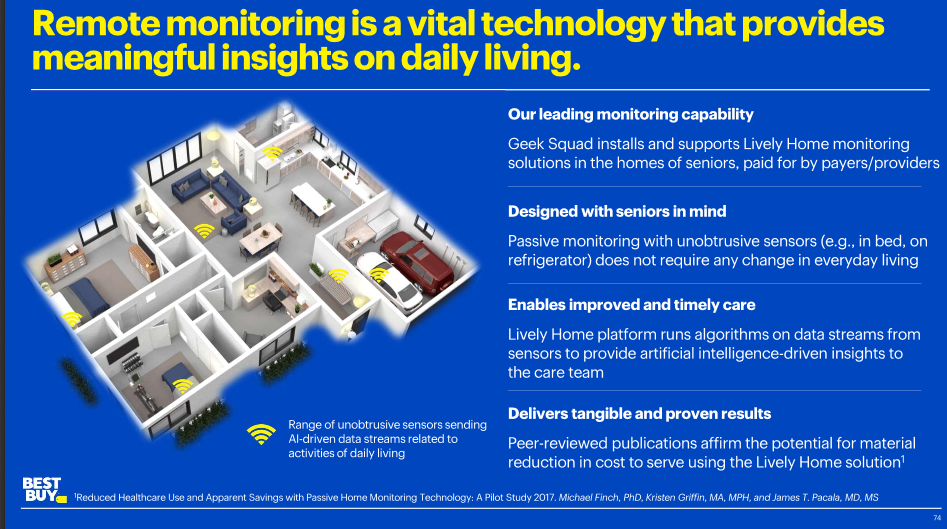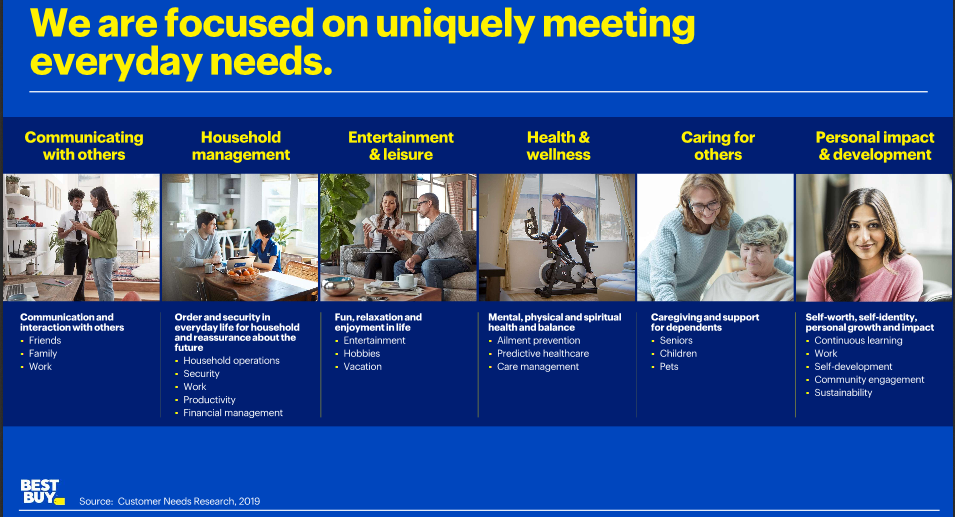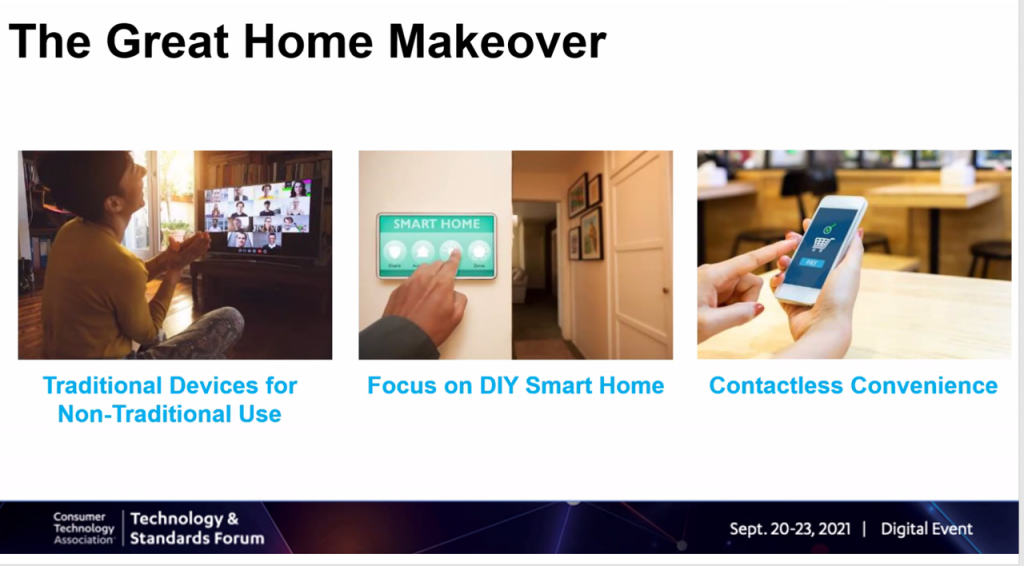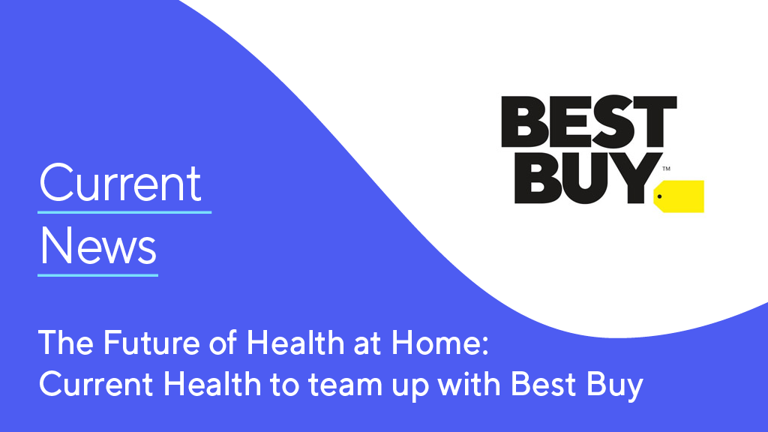Best Buy continues to grow its health/care market footprint and service portfolio through remote health monitoring, first announced in the press release, Best Buy to acquire Current Health to help make home the center of health. The financial deal was disclosed yesterday at £300 million, about $400 million US dollars (FYI, Current Health is based in Scotland, thus value given in pounds sterling, with a particularly strong US $ exchange right now at 1.34).
Remote monitoring has been part of Best Buy Health’s vision from the time the company explained its big audacious goals for the health ecosystem in 2018 when the company discussed how it would leverage its $800 million acquisition of GreatCall as part of its corporate strategy. The first graphic comes out of a Best Buy analyst meeting detailing the company’s health-growth strategy.
 From the Best Buy press release:
From the Best Buy press release:
Current Health’s enterprise care-at-home platform enables healthcare organizations to deliver high-quality, patient-centric care at a lower cost. The company integrates patient-reported data with data from biosensors – including their own continuous monitoring wearable device – to provide healthcare organizations with actionable, real-time insights into the patient’s condition. Leveraging clinical algorithms that can be tailored to the individual patient, Current Health identifies when a patient needs clinical attention, allowing organizations to manage patient care remotely or coordinate in-home care via its integrated service partners. The Current Health platform brings together telehealth capabilities, patient engagement tools, and in-home connectivity to provide a single solution to manage all care in the home.
Current Health’s CEO Chris McCann wrote on the company’s website,
The COVID-19 pandemic has taken millions of lives and affected billions more. It has led to extreme pressures on our healthcare services, our healthcare professionals, and the broader society. We’ve also seen a truly inspiring response from the healthcare, government, and business communities as well as from society as a whole. We’ve seen levels of innovation and change that we previously thought impossible. Healthcare, often portrayed as a conservative, slow-moving industry, reinvented itself almost overnight with a focus on agility and decentralization. Among the many innovations we’ve seen in the global COVID response—from vaccine development to the incredible efforts of healthcare providers to adjust their delivery models—it has been clearly demonstrated that we can deliver far more healthcare in the home than ever thought possible.
Current Health, founded in 2015, is now used in at least a dozen U.S. and U.K. health systems. The company has built a team in the U.S. with deep health care expertise. collaborating with digital health innovators to build out the platform (one example: Mayo Clinic and Dexcom, among others).
This deal represents Europe’s second-largest digital health deal to-date.
 Health Populi’s Hot Points: We can reasonably expect the emergence of the Omicron variant to lengthen the long tail of the coronavirus pandemic recovery in the U.S. und the world.
Health Populi’s Hot Points: We can reasonably expect the emergence of the Omicron variant to lengthen the long tail of the coronavirus pandemic recovery in the U.S. und the world.
The home became a safe place for working, playing, learning, and praying in 2020, and consumers doubled-down on investing in their home spaces to accommodate more daily life-flows through 2021.
Retail data tracking from NPD and other analysts demonstrate serious spending on kitchens, home office spaces, connected fitness equipment, along with general home improvement inside-and-outside alike.
 Data from the Consumer Technology Association (CTA) has also tracked more consumer spending for and adoption of wearable technology to track health and medical information. Best Buy’s acquisition of Current Health bolsters the landscape of health care delivery to the home.
Data from the Consumer Technology Association (CTA) has also tracked more consumer spending for and adoption of wearable technology to track health and medical information. Best Buy’s acquisition of Current Health bolsters the landscape of health care delivery to the home.
In CTA’s recent presentation on consumer electronics spending trends in 2021, the Association summarized the home improvement shift as “The Great Home Makeover,” noting the adoption of traditional devices for non-traditional uses, a focus on DIY’ing the Smart Home, and more contact-less convenience as voice tech and phone apps are increasingly used by mainstream/Main Street consumers and families.
We’ll see more of this evidence for the home as health hub at CES 2022 in Vegas (in person and virtually). No doubt Best Buy will be walking the conference floor in search of new prospects to continue to build out its footprint in the health/care ecosystem. I’ll be there, too, to observe and listen and speak about the growing home-as-health-care space across all dimensions of well-being: physical, mental and behavioral, financial, and social. Stay tuned….





 Interviewed live on BNN Bloomberg (Canada) on the market for GLP-1 drugs for weight loss and their impact on both the health care system and consumer goods and services -- notably, food, nutrition, retail health, gyms, and other sectors.
Interviewed live on BNN Bloomberg (Canada) on the market for GLP-1 drugs for weight loss and their impact on both the health care system and consumer goods and services -- notably, food, nutrition, retail health, gyms, and other sectors. Thank you, Feedspot, for
Thank you, Feedspot, for  As you may know, I have been splitting work- and living-time between the U.S. and the E.U., most recently living in and working from Brussels. In the month of September 2024, I'll be splitting time between London and other parts of the U.K., and Italy where I'll be working with clients on consumer health, self-care and home care focused on food-as-medicine, digital health, business and scenario planning for the future...
As you may know, I have been splitting work- and living-time between the U.S. and the E.U., most recently living in and working from Brussels. In the month of September 2024, I'll be splitting time between London and other parts of the U.K., and Italy where I'll be working with clients on consumer health, self-care and home care focused on food-as-medicine, digital health, business and scenario planning for the future...